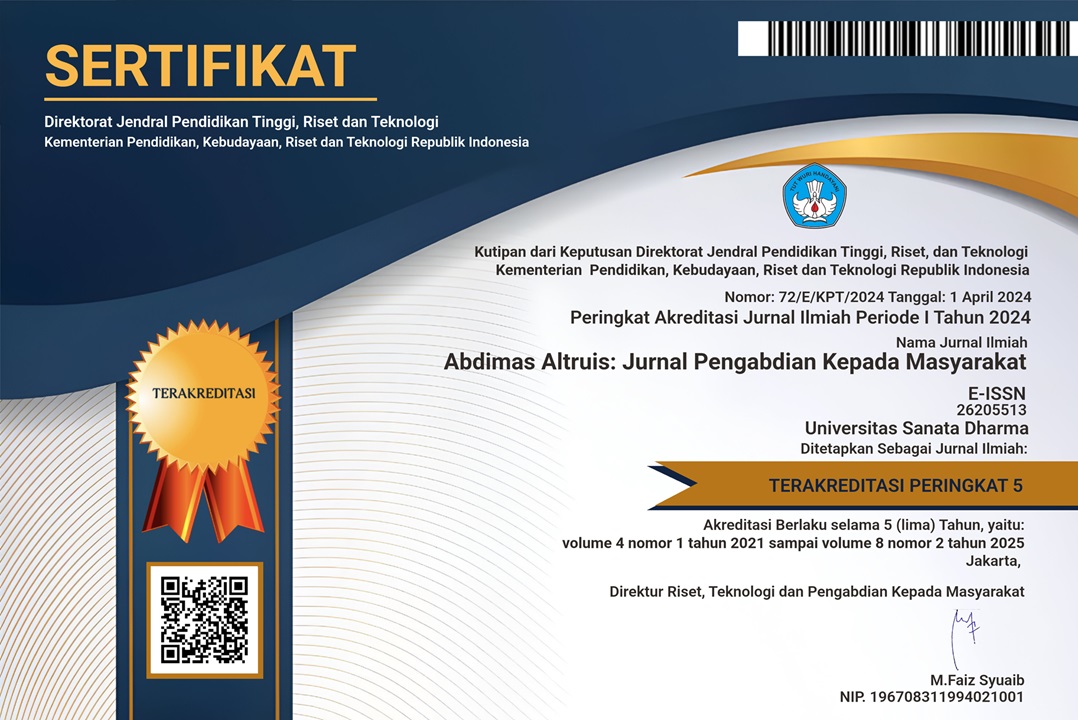PELATIHAN PENERAPAN KURIKULUM MERDEKA BELAJAR DI DALAM KONTEKS PENGAJARAN DAN PEMBELAJARAN BAHASA INGGRIS
(1) Master's Program in English Language Education, Universitas Kristen Satya Wacana (Salatiga, Indonesia)
(2) Master's Program in English Language Education, Universitas Kristen Satya Wacana (Salatiga, Indonesia)
(3) Master's Program in English Language Education, Universitas Kristen Satya Wacana (Salatiga, Indonesia)
(4) Master's Program in English Language Education, Universitas Kristen Satya Wacana (Salatiga, Indonesia)
(*) Corresponding Author
Abstract
This article reports a community service program held by the Master’s Program in English Language Education at the Faculty of Language Arts, Universitas Kristen Satya Wacana, in collaboration with the Salatiga Education Department. The program was in the form of teachers’ training about best practices of implementing the Merdeka Belajar curriculum in the English language teaching and learning practices. Thirty-six (36) English teachers in junior high schools in Salatiga participated in this training from July 31 – August 1, 2023. There were five main sessions in the training, namely (1) critical thinking and Merdeka belajar, (2) differentiated instruction in the ELT contexts/EFL classrooms, (3) digital text-based learning for teaching English in secondary schools, (4) best practices in technology-enhanced language learning, and (5) the implementation of Merdeka Belajar curriculum: A reflection. Brief descriptions of what the presenters discussed in each of their sessions, directions for future community service programs, and research are presented.
Keywords
Full Text:
PDFReferences
Badan Standar, Kurikulum, dan Asesmen Pendidikan, Kementerian Pendidikan, Kebudayaan, Riset, dan Teknologi Republik Indonesia. (2022). Panduan pembelajaran dan asesmen pendidikan anak usia dini, pendidikan dasar, dan menengah. Jakarta: Kemdikbudristek. Banegas, D. L., & Castro, L.S.V. (2016). Criticality. ELT Journal, 70(4), 455–457. https://doi.org/https://doi.org/10.1093/elt/ccw048 Breaux, E., & Hatch, T. (2013). How the best teachers differentiate instruction. New York: Routledge. Egbert, J., & Shahrokni, S. A. (2018). CALL principles and practices. Washington DC: Open Text Washington State University. https://opentext.wsu.edu/call/ Freire, P. (2000). Pedagogy of the oppressed (M. B. Ramos, Trans.). New York: Continuum Books (Original work published 1968). Gardner, H., & Hatch, T. (1989). Educational implications of the theory of multiple intelligences. Educational Researcher, 18(8), 4–10. https://doi.org/10.3102/0013189X018008004 Greenway, R. (2002). The art of reviewing. Journal of the Institute of Training and Occupational Learning, 3(1), 47–53. Hadley, G., & Boon, A. (2023). Critical thinking. New York: Routledge/Taylor & Francis. Ihsan, D. (2023, May 2). Nadiem: Saat ini siswa lebih tenang dan guru bebas berinovasi. Kompas.Com. Dikutip dari https://www.kompas.com/edu/read/2023/05/02/123242571/nadiem-saat-ini-siswa-lebih-tenang-dan-guru-bebas-berinovasi Oxford, R. L., & Burry-Stock, J. A. (1995). Assessing the use of language learning strategies worldwide with the ESL/EFL version of the strategy inventory for language learning (SILL). System, 23(1), 1–23. https://doi.org/10.1016/0346-251X(94)00047-A Pradipta, B. A. (2023, July 30). Mengenal karakteristik Kurikulum Merdeka, 3 poin kunci untuk transformasi. Kompas.Com. Dikutip dari https://www.kompas.com/tren/read/2023/07/30/100000965/mengenal-karakteristik-kurikulum-merdeka-3-poin-kunci-untuk-transformasi?page=all#page2 Reid, J. M. (1987). The learning style preferences of ESL students. TESOL Quarterly, 21, 87–111. https://doi.org/https://doi.org/10.2307/3586356 Timur, A. F. (2023, May 5). Guru garda utama Kurikulum Merdeka. Kompas.Com. Dikutip dari https://www.kompas.com/edu/read/2023/05/05/165831471/guru-garda-utama-kurikulum-merdeka Tomlinson, C. A. (2017). How to differentiate instruction in academically diverse classroom (3rd ed.). Alexandria: ASCD. Yuan, R., & Stapleton, P. (2020). Student teachers’ perceptions of critical thinking and its teaching. ELT Journal, 74(1), 40–48. https://doi.org/10.1093/elt/ccz044
DOI: https://doi.org/10.24071/aa.v6i2.7027
Refbacks
- There are currently no refbacks.
Abdimas Altruis: Jurnal Pengabdian Kepada Masyarakat telah terakreditasi nasional Sinta 5 oleh Kementerian Pendidikan, Kebudayaan, Riset dan Teknologi Republik Indonesia berdasarkan surat keputusan No.Surat Keputusan 0547/E5 /DT.05.00/2024. Masa berlaku 5 tahun : Vol 4 No 1 Tahun 2021 s/d Vol 8 No 2 Tahun 2025.

Terindeks oleh:
This work is licensed under CC BY-SA.
Creative Commons Attribution-ShareAlike 4.0 International License.
Abdimas Altruis: Jurnal Pengabdian Kepada Masyarakat diterbitkan dua kali setahun, yakni pada April dan Oktober,
oleh Lembaga Penelitian dan Pengabdian Kepada Masyarakat, Universitas Sanata Dharma, Yogyakarta, Indonesia.























